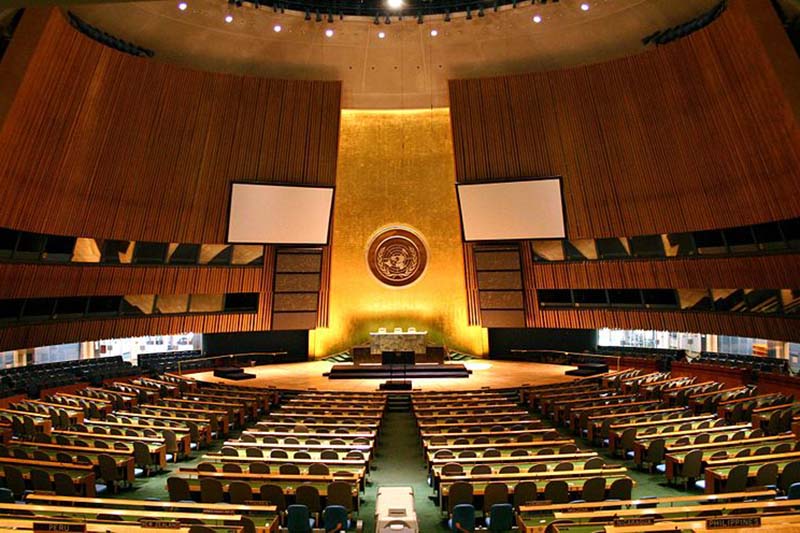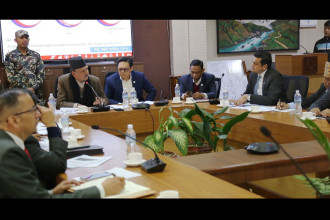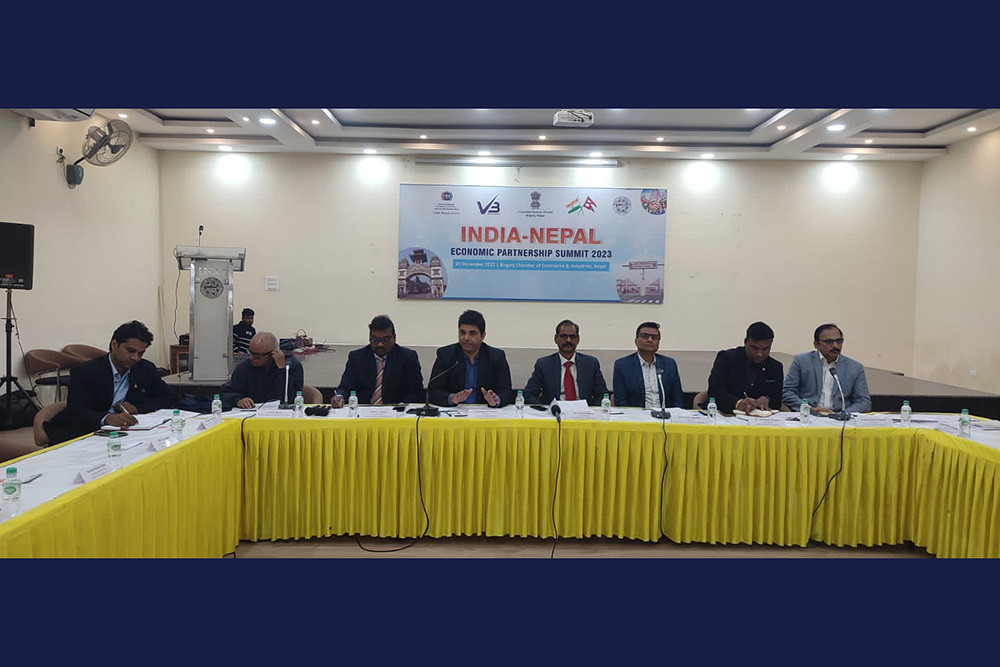
WASHINGTON DC: The United Nations General Assembly has endorsed the proposal for Nepal to graduate from a least-developed country status to a middle income developing nation.
Nepal's graduation might create some challenges in terms of export of some goods to the international market but it gives out the message that Nepal is no longer a least developed country (LDC).
Similarly, Nepal's participation in the UN Climate Change Conference-COP-26 held last month in Glasgow of Scotland was another important aspect while the Prime Minister's meeting with world leaders on the sidelines of this conference has played a significant role in enhancing the country's bilateral and multilateral relations.
Meanwhile, December 14 this year marked the 65 years of Nepal's membership in the United Nations and it has been a key partner of the world body in accordance with its charter. Similarly, the UN has played a notable role in Nepal's socio-economic development. The UN's role in the country's peace process is also worth mentioning in this regard.
Nepal's Permanent Representative to the United Nations, Amrit Bahadur Rai, who actively participated in the various sideline meetings of the UNGA, has also been articulating Nepal's commitments, contributions and concerns in the UN.
Regarding the type of preparation on Nepal's part after the UNGA endorsing the proposal on its graduation to a middle-income country status, Rai said there is the provision of the UN's Committee on Development Policy recommending a country for the graduation if that country continuously qualifies in any two of the three criteria fixed by the UN in the two tri-annual reviews. These three indicators are per capita income, human assets and economic and environmental risk reduction.
According to him, although Nepal had qualified for the same in the tri-annual review carried out in 2015 and 2018, it had postponed its graduation three years from 2018 in view of the reconstruction following the 2015 devastating earthquake. The UN Committee on Development Policy in February 2021 recommended Nepal for its graduation and the proposal to this connection was passed by the UNGA on November 24, 2021.
"Now, Nepal has entered the graduation phase with five years of the preparation period. It means that Nepal will remain in the group of least developed countries until the end of 2026. It will be categorised as the middle income developing country only after that. Generally, three years are given for the preparation but this time it has been extended to five years taking into account the negative impact of Covid 19 in the LDCs," Rai elaborated.
In this context, Rai has suggested that Nepal should prepare a concrete transition plan for the five-year preparatory period and move forward accordingly because it will not be getting several facilities like trade concessions and entry into the market that it had been enjoying as a least developed country from the UN Development System, the European Union, the World Trade Organisation and other bilateral and multilateral donor agencies and development partners.
In this context, Rai stressed making the economy productive and self-reliant by promoting foreign investment in industry, creating employment opportunities and implementing programmes for productivity growth and increased export trade. Even after Nepal graduates to the middle-income country status, it will still require foreign cooperation including foreign capital and technology and others to become a prosperous nation.
Nepal's permanent representative to the UN also said that Nepal needs to be active so as to ensure the continued resources required for the socio-economic development post-graduation by timely identifying the sources of concessional loans and other assistance through strong economic diplomacy.
According to him, Nepal still needs to remain active in the group of land-locked developing countries. "Similarly, climate change and environmental protection have been established as the major international issues and agreement has been made to set up an international fund with a large amount of money for facing up to these challenges. In the context of Nepal suffering from the climate change impacts, it should prepare and initiate the required action plan for seeking financial sources from such international funds."
When asked what types of strategic action plan to tackle possible challenges in export trade in the aftermath of the graduation of Nepal to a middle-income developing country, Rai said as the least developed country, Nepal has so far been entitled the quota-free, duty-free and other several trade facilities to promote the international trade of the LDCs. Following graduation, such facilities will be cut for Nepal. Likewise, it will not get the EU subsidy on everything but arms after three years of graduation. “So our focus will be on the producing quality goods and products to compete in the international market. Standard goods and high productivity are vital to promoting export trade.”
Promotion of domestic as well as foreign investment is necessary to boost up the industrial sector.
As he said, he saw the need of making efforts to achieve the EU’s ‘generalised system of performance’ facility and to have a bilateral agreement with some other nations for trade preference. Additionally, clear trade policies are needed.
In his response to a query about Nepal’s presence in the recent UNGA and its impact on international relations and diplomacy, he said a high-level delegation led by the Prime Minister which also included the Foreign Minister had represented Nepal in the UNGA and other events held on the sidelines. Nepal had informed the world about current pressing issues like Covid 19 and climate change and their impact on Nepal’s food system. The world community was apprised of the policies and efforts of the Government of Nepal to face the Covid 19 crisis, for poverty alleviation and addressing the nutrition issues and of Nepal’s goal to reduce the carbon emission to zero through the promotion of hydropower and other sources of renewable energy.
On strategies made by Nepal on actively providing contributions to establish peace in the world through its peacekeeping, which has been praised globally, he said that having joined the UN peacekeeping since 1958, Nepal has been continuously contributing as a peacekeeper across the world and it has come as a top country to send peacekeepers.
On further strengthening this role, some efforts like constant coordination with the UN Secretariat, the implementation of related standards including gender equality and the increment of the country's representatives at the UN high level related to the mobilisation of peacekeepers are underway.
The Birendra Peace Operations Training Centre wherein peacekeepers opting for UN peacekeeping get training will be equipped so as to produce qualified peacekeepers fitting into the UN training guidelines.
Responding to how cooperation between Nepal and the UN is going on 66 years after the country took UN membership, he said Nepal is continuously committed to the UN Charter since it took UN membership in 1955. Nepal's foreign policy is in line with the UN Charter. Similarly, its relations with the UN have been guided by the concept of the UN being in the frontline of protecting world peace and sovereignty and freedom of small countries.
Also, it is advocating and playing an active role in the initiatives of the UN in the areas of socio-economic development of poor and underdeveloped countries, in protecting and promoting human rights, sustainable development, and against terrorism.
It has been actively raising voices in further consolidating the UN by increasing participation in its major organs like the UN Security Council, its effectiveness, responsibility and impartiality.
It has put its view that there should be a priority of multi-sectoral diplomacy to make its international relations impartial, democratic, equitable and justifiable and the UN should be the centre of such multi-sectoral diplomacy. It has always praised the contributions of the UN and its specialised agencies to its socio-economic development and the UN's role in helping take the country's internal armed conflict to a peace accord and in the process of transforming it to sustainable peace.
Source: RSS
READ ALSO:- Private Sector Deliberates Pros & Cons Of Nepal’s Ldc Graduation
- Nepal graduates from least developed country category
- EU commits to green, resilient and inclusive development of Nepal
- Govt focusing on promotion of clean energy to cope with climate change: PM Deuba
- Italy hosts a climate-focused G20 as geopolitics shift
Published Date: December 21, 2021, 12:00 am
Post Comment
E-Magazine
RELATED B360 National





